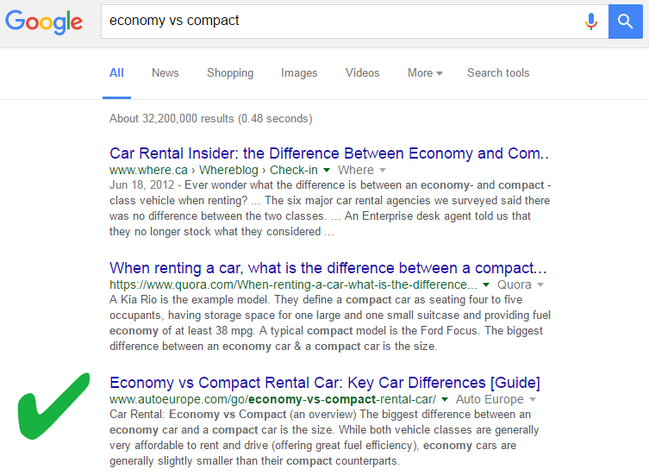Beginner's Keyword Research Guide
There are a lot of guides out there with tips on keyword research for beginners and advanced SEOs alike, most of which fall into one of three categories:
In this guide I try to deliver something right in the middle ... a straight-forward, easy-to-understand keyword research strategy which I have used successfully, and which you can start using today to identify what I call "pivot keywords" (more on that in a minute).
I also won't be promoting any affiliate products in this post ... you can use this strategy immediately and see results quickly without spending a dime.
Read this post and you'll learn an effective keyword research strategy that both experienced SEOs and beginners can use to successfully identify low-competition, high search-volume terms to rank for quickly and with very little effort.
- Guides that are so basic that you finish reading without learning anything new.
- Guides that are so in-depth that you end up only absorbing SOME of what was covered.
- Guides that are really only written and designed to try to sell you a product which earns the writer a commission.
In this guide I try to deliver something right in the middle ... a straight-forward, easy-to-understand keyword research strategy which I have used successfully, and which you can start using today to identify what I call "pivot keywords" (more on that in a minute).
I also won't be promoting any affiliate products in this post ... you can use this strategy immediately and see results quickly without spending a dime.
Read this post and you'll learn an effective keyword research strategy that both experienced SEOs and beginners can use to successfully identify low-competition, high search-volume terms to rank for quickly and with very little effort.
The Three Steps to Effective Keyword Research
While advanced keyword research can get really complicated, when you're doing basic keyword research to identify new content ideas for your business website there are really only three steps to identifying a keyword or a list of keywords which are
a) relevant to your industry, and
b) easy to rank for quickly.
These three steps are:
a) relevant to your industry, and
b) easy to rank for quickly.
These three steps are:
- Establish a list of topically relevant content ideas
- Generate a list of keyword ideas related to those content ideas
- Qualify the keywords and select the best keywords for your site.
Choosing the Right Topic For Your New Content
Client & Customer Feedback
If you're a business that sells a product or service you could ask your clients or customers what they'd like to know more about or are confused about and then create a piece of content which answers that question (generally if one person is confused about something, many people will be).
In my day job I serve as the SEO Manager for Auto Europe - an international car rental company which primarily serves US customers planning to rent a car during their trip to Europe. We use our customer base to generate content ideas both by monitoring our reviews and customer service department to identify pain points for customers (we then will come up with a plan to create content which helps to address that confusion and prevent those issues), and we also periodically conduct surveys of travel agents and direct customers to learn what they want to know more about when renting a car.
We've found this to be a really effective way to target customers who may be close to booking on another site ... many people have questions about fees and taxes during the final stages of the booking process, and if we can answer their questions when they open a new tab and search for more information, some of these visitors will compare our rates to the ones they were just looking at, choosing to book that car with us instead.
In my day job I serve as the SEO Manager for Auto Europe - an international car rental company which primarily serves US customers planning to rent a car during their trip to Europe. We use our customer base to generate content ideas both by monitoring our reviews and customer service department to identify pain points for customers (we then will come up with a plan to create content which helps to address that confusion and prevent those issues), and we also periodically conduct surveys of travel agents and direct customers to learn what they want to know more about when renting a car.
We've found this to be a really effective way to target customers who may be close to booking on another site ... many people have questions about fees and taxes during the final stages of the booking process, and if we can answer their questions when they open a new tab and search for more information, some of these visitors will compare our rates to the ones they were just looking at, choosing to book that car with us instead.
Competitor Analysis

One of the best methods to identify new profitable keywords is to look at what your competitors are doing. You can do this to generate complete keyword lists to target, but what I like to do is to take competitor research a step further to see if I can identify new content categories which they may be targeting directly or indirectly. This way I can do a deeper dive into uncovering keyword and content ideas within that category.
One point on competitor keyword research: As an SEO it can be really easy to think you're doing a good job when you simply copy your competitors if they are successful, but I think it's important to build upon their success and work to overtake them, or you'll perpetually be playing catch-up. There's a clear advantage when you're the first to publish content on a topic people are searching for.
One point on competitor keyword research: As an SEO it can be really easy to think you're doing a good job when you simply copy your competitors if they are successful, but I think it's important to build upon their success and work to overtake them, or you'll perpetually be playing catch-up. There's a clear advantage when you're the first to publish content on a topic people are searching for.
Using the Keyword Planner to Uncover Topical Keywords
Using Google's Keyword Planner is a great (and free) way to gain some information about the search volume and the paid search competition level of keywords. A lot has been written on this topic already, and in my opinion Brian Dean's post is the best, most comprehensive guide on the subject and can get you on the right track if you're new to using this free tool.
What Are Pivot Keywords & Why Are They Important?
A "Pivot Keyword" is what I call any longtail keywords with extremely low competition which contains a core term which is more competitive and has higher search volume. By identifying these longtail keywords and creating optimized content which targets them, you will have an easy time ranking for the longtail, and once you rank for the longtail term which is directly related to the shorter, high-volume query, the quality signals which come from a high CTR (click-through-rate) on your page-one listing in the SERPs can help you rank competitively for the shorter keyword you've targeted within the longtail.
Pivot Keyword Case Study

While researching car class keywords for Auto Europe, I identified that many people were searching for keywords comparing different classes of rental cars they were trying to decide between (Economy vs Compact for example). Since it can sometimes take some effort to rank competitively for a generic keyword like this for which many webpages are relevant, I identified the related longtail keyword Economy vs Compact Rental Car ... for which there was a significantly lower level of competition. The fact that the longtail had really low relative search volume (90 vs. 1000 monthly searches) didn't concern me, because when I optimized for the longer phrase, I'd also be optimizing the page for the shorter query which had potential to bring in a lot more traffic to the site.
By creating a piece of content targeting this longtail "pivot keyword" I was able to rank on the first page for my longtail within a week of publishing the content and about 30 days later I was ranking on the first page for Economy vs Compact ... eventually landing in the #3 position for that keyword. With a bit more effort applied, that page should be able to reach the #1 position in the SERPs for this keyword ... netting Auto Europe significant free brand exposure based on the search volume of this query. Granted, this isn't a query that's particularly close to the point of purchase for users, but it only took about 30-40 minutes to discover the opportunity and write and publish the content.
Qualifying Pivot Keywords
One of the most important parts of identifying a high-quality pivot keyword phrase which you can have success with is evaluating exact match competition to determine how competitive each keyword phrase will be.
To do this, you'll want to open Chrome in Incognito mode (Ctrl+Shift+N) and then do a phrase match for the longtail keyword and for the shorter, high search-volume keyword contained within your pivot keyword phrase. The # of exact match results can offer a good indication of how much organic competition there is for a specific keyword phrase and with time you'll learn what level of exact-match competition is low-effort, medium-effort and a real challenge for you to rank your website for with minimal effort spent on off-page SEO and link building.
Here's the analysis of the pivot keyword phrase used in the case study above passing the qualification test as a quality phrase to target with a piece of content:
To do this, you'll want to open Chrome in Incognito mode (Ctrl+Shift+N) and then do a phrase match for the longtail keyword and for the shorter, high search-volume keyword contained within your pivot keyword phrase. The # of exact match results can offer a good indication of how much organic competition there is for a specific keyword phrase and with time you'll learn what level of exact-match competition is low-effort, medium-effort and a real challenge for you to rank your website for with minimal effort spent on off-page SEO and link building.
Here's the analysis of the pivot keyword phrase used in the case study above passing the qualification test as a quality phrase to target with a piece of content:
Example of a more challenging pivot keyword

When you compare the sample phrase above (a good candidate based on competition levels) to another, similar pivot keyword phrase (right) taking the same approach you'll quickly see how this method of evaluating competition through submitting an exact-match query is an easy way to understand how competitive a pivot keyword is likely to be and also to narrow your focus on the best longtail phrase to target. This is a crucial step to keyword research, especially when you're trying to generate traffic to a new blog without much domain authority.
So what should you do in this example? Well if I was the one trying to come up with a strategy to rank for the generic carving a pumpkin keyword, I wouldn't necessarily give up ... I'd probably try to find a similar, less-competitive longtail phrase to target, acknowledging that due to how many results there are for the exact match "carving a pumkin" query it will be more challenging to rank for that larger term.
As it turns out there's a slightly more specific longtail we might try which has comparable search volume (the Keyword Planner also has it averaging 70 searches per month) and a much lower level of exact-match organic search competition (1,830 results vs. 20,700):
As it turns out there's a slightly more specific longtail we might try which has comparable search volume (the Keyword Planner also has it averaging 70 searches per month) and a much lower level of exact-match organic search competition (1,830 results vs. 20,700):
With that in mind I'd probably create a detailed, well-optimized blog post titled "Carving a Pumpkin With a Dremel" and focus on ranking for that longtail keyword and then I would spend some time sharing my post with websites who have linked to other guides about carving a pumpkin (but who may not mention that using a Dremel is an option) as a way to increase the authority of my page and begin working toward ranking for the high search volume, competitive phrase "carving a pumpkin" which I set as my long-term SEO target.
Final Thoughts on the Basics of Keyword Research for Beginners
While there are a lot of other effective keyword research techniques (which I'll cover in subsequent posts), this simple method using free tools is a great way to begin finding good organic search opportunities for your website or blog. Try finding a few pivot keywords which match the criteria I've outlined above and see what works for your site. If you have success (or run into issues) let me know in the comments!








